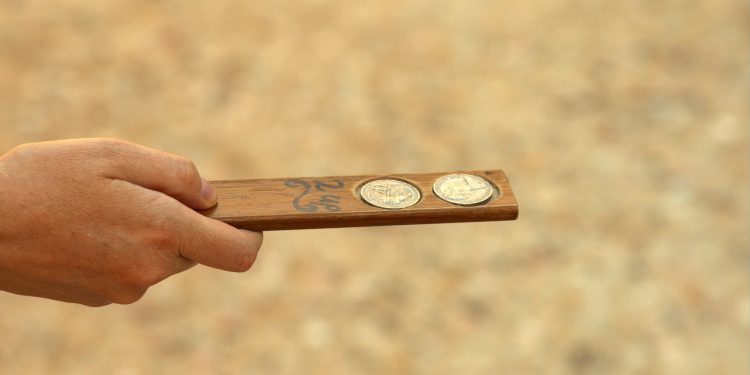Two-up is an iconic Australian gambling game with historical roots dating back to the 18th century among convicts. The game gained popularity among Australian soldiers during the First World War as a form of entertainment and camaraderie.
Despite its cultural significance, the legality of two-up is restricted. Until the early 1980s, the game was generally illegal throughout the year, with an exception made on ANZAC Day, to honour the soldiers who played it. The game remains primarily illegal outside of ANZAC Day due to its classification as unregulated gambling, which poses potential issues with fairness and societal impact.
Enforcement of these laws falls under various gaming and gambling legislation, with specific provisions addressing the legality of two-up on the one day it is broadly permitted.
What Are the Rules for Two-up?
The rules of this traditional game are simple. All that is required to play the game are two coins, a flat wooden “kip” or paddle, and a circle marked on the ground known as the “ring.” There is a spinner who toses the coin and observers who bet on the outcome.
The spinner flips two coins simultaneously and bets on the outcome, typically whether both coins will land heads up, both tails up, or with one coin a head and the other a tail.
Spectators gather around the ring to bet on the outcomes, predominantly wagering on either Heads or Tails. The Spinner often initiates the betting by making a call with someone in the crowd.
Why is Playing Two-up illegal in New South Wales?
In Australia, the gambling industry is strictly regulated by state and federal laws. These rules ensure that gambling is conducted responsibly, preventing the harmful effects of illegal gambling activities.
Under section 14 of the Unlawful Gambling Act 1998, two-up is classed as an unregulated form of gambling. The maximum penalty for participating in a two-up game is 50 penalty units ($5,500), imprisonment for 12 months or both.
However, exceptions for two-up apply under the Gambling (Two-up) Act 1998.
What Conditions Apply When Playing on Anzac Day?
Under the Act, there must be no payment for entry into the premises on which the game is to be conducted, no payment for the right to participate in the game (other than by the placing of money by way of a bet), and no commission on bets or winnings.
There may, however, be instances where two-up games are conducted on the premises of a registered club, and that involves payment or fee referred to above.
In these circumstances, a game of two-up is still allowed, provided the conduct of the game is authorised by the club and all payments for entry and participation are for the benefit of a charity, body or other organisation prescribed by the regulations and does not to form part of the funds of the club.
Can Minors Participate in Two-Up on Anzac Day?
When conducting a game of Two-up, a person must not make or accept any bet, or permit any bet to be made or accepted, with or from a minor in relation to any such game.
The maximum penalty is 50 penalty units ($5,500), imprisonment for 12 months or both.
There is a defence under this section if, before any such bet was made or accepted, acceptable proof of age for the minor was produced to the person. Acceptable proof of age is documentary evidence (such as a licence or proof of age card) that might reasonably be accepted as applying to the person and proving that the person is at least 18 years old.
If a minor is permitted to participate, there may be additional offences that could be committed relating to betting with or by minors.
The Penalties for Unlawful Games of Two-up
There have been instances where individuals or organisers have faced legal proceedings due to involvement in illegal two-up games. Court cases can result in various penalties, including fines and, in some cases, prison sentences. These cases are often publicised to deter others from participating in or hosting illegal gambling events.
Per Section 25 of the Act, if a game of two-up is conducted and the requirements referred to in Section 7 or 8 are not satisfied or the game conducted in Broken Hill is not conducted per Part 3, a participant in the game is not guilty of an offence under section 14 of the Unlawful Gambling Act 1998.
This is unless it is proved that the participant knew, or in the circumstances should have known or suspected, that the game was unlawful.
So, Should you Play Two-up on Anzac Day?
Despite its illegal status on other days, the game’s association with Anzac Day means its practice is generally met with tacit public and law enforcement approval. The context of Anzac Day softens public perception of the game from a form of gambling to a time-honoured tradition.
Key Takeaways
- Two-up is a traditional Australian game, legally played on ANZAC Day, Victory in the Pacific Day, and Remembrance Day afternoon.
- It's generally illegal due to its classification as unregulated gambling, with exceptions under the Gambling (Two-up) Act 1998.
- Minors are prohibited from participating in or betting on two-up games, with significant penalties for violations.
- Lawful two-up games require no entry fee or payment beyond betting and can be played in registered clubs for charity benefits.
- There's a legal defense for participants in unlawful two-up games if they were unaware of the game's illegality.
Written By

James Janke
James Janke is founding partner at Hamilton Janke Lawyers, and has more than decade of experience as a Criminal Defence Lawyer. Admitted to both the Supreme Court of New South Wales and High Court of Australia




